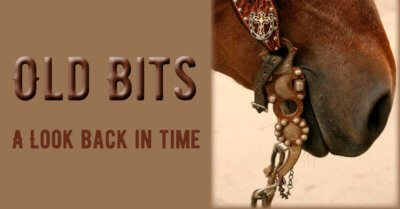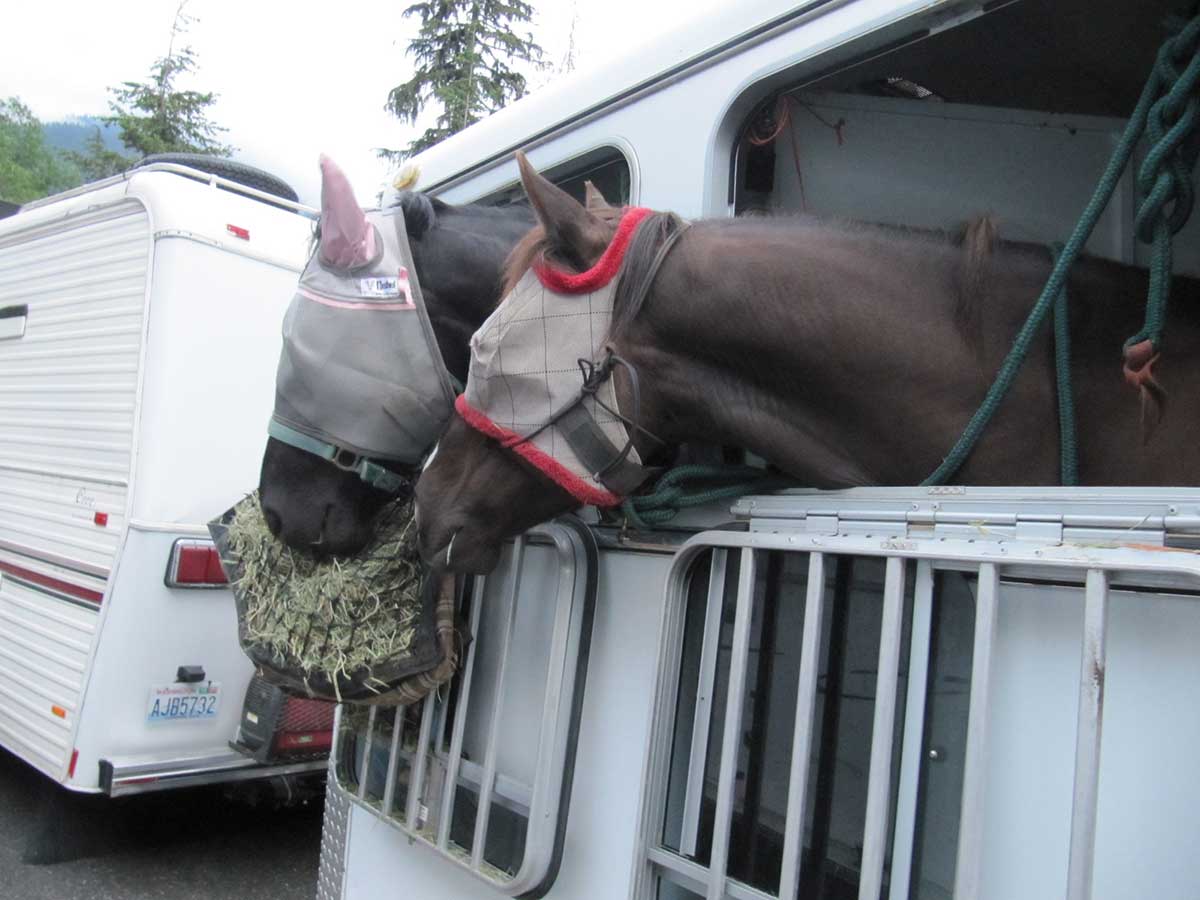Life in a Horse Trailer
Dealing with and Minimizing Travel-induced Stress
by David Sauter, DVM, Kulshan Veterinary Hospital
In this installment of the Doctors’ Corner we’ll examine the kinds of stress trailering puts on a horse and the associated medical concerns, followed by measures that encourage safer, healthier transport.
FACTORS PRODUCING TRAVEL-INDUCED STRESS
Separation & Isolation: Like many of us, the daily routines create a world that is predictable and safe. Leaving home creates anxiety, nervousness, and even fear, all of which vary with the age, personality, and experience of the individual, and ultimately weakens the immune system, making horses more susceptible to infection.
Confinement: Besides playing and sleeping, wandering around and eating makes a horse happy. Everything works better too. Browsing, for example, is part of a horse’s nature and occupies them for 16 hours a day. But in a trailer, they’re unable to move very far, stretch, scratch, rest, and especially bend their head and neck, one of the ways the horse cleans out particles (e.g. dust and mold) and secretions from his airways.
Cells that secrete mucus bind these contaminants to microscopic hairs lining the airways like tape picks up lint. In a wavelike motion the hairs, called cillia, push the material up and out of the lungs.
This is less effective if the horse’s head is held up for prolonged periods of time, so contaminants accumulate in the airway and bacterial counts increase. Also, this held-up head posture forces the horse to breathe and re-breathe air from his breathing zone, the three feet in front of his face. Feed stored nearby can increase the levels of dust, mold, and bacteria in this zone which are then concentrated in the horse’s airways by re-breathing the same contaminated air.
All this combines to increase the load on a respiratory tract that is less able to clear out contaminants in an animal whose immune defenses are compromised.
MEDICAL CONCERNS
Reduced Appetite: Due to stress, horses lose between 0.44 and 0.55 per cent of their body weight per hour during transport, mostly in water weight, due to changes in feed and water. The rate of weight loss increases on longer trips. In a 12-hour trip, a horse could lose 50 to 60 pounds and take 2-3 days to recover the loss.
Respiratory Disease: The problem most often associated with horse transport is respiratory disease. Pleuropneumonia, or Shipping Fever, the most severe form, is an infection causing very high fever, depression, weakness, possibly leading to complications such as laminitis and even death. More commonly, horses can contract other, non-life threatening but still serious, respiratory infections that result in loss of performance and costly medical treatments.
Colic: Abdominal pain and discomfort are signs of such conditions as impaction, one of the more common causes of colic associated with hauling. Confinement, dehydration, and limited movement can lead this problem especially if the horse’s appetite is suppressed.
Poor performance: A listlessness brought on by fatigue, dehydration, weight loss, digestive disturbances, adjustment to change in time zones and climate. It may just be that the animal is simply worn out, but it could also be some subtle indications or early stages of disease that are not recognized by the horse’s caretaker.
RECOMMENDATIONS
“Doctor, how can I keep from getting sick?” said the patient.
“Stay healthy!” said the doctor.
Horses that have had a recent infection are more likely to get seriously ill during transport, so begin with a healthy horse and:
- Monitor the horse by a three-part schedule: 2-3 days pre-shipping, shipping, and 3-4 days post-shipping (sometimes it takes 2 or 3 days after arrival for illness to become evident). Keep a written record of body temperature, heart rate, respiratory rate, body weight, hay consumption, grain consumption, and water consumption during all three stages. This will help identify problems before they become serious.
- Vaccinations should be given at least two weeks before departure.
- Pre-shipping medications to avoid: Non-steroidal anti-inflammatories such as Bute and Banamine will mask a fever. Single use of antibiotics is of questionable value and can lead to antibiotic resistance.
- Pre-shipment mineral oil may be of some temporary benefit to lubricate the intestinal tract.
- Decrease grain 1-2 days prior to shipment, during shipment, and 1-2 days after shipment.
- Limit lengthy trips to less than 12-hour segments, though short trips less than 3-4 hours are unlikely to result in transport-related illness.
- Keep it rolling. Short breaks are not very helpful. It’s better to get to the destination and not prolong the misery unnecessarily.
- Offer water about every 4 hours (adjust depending upon weather).
- Avoid hot, humid hours of the day.
- Open the air vents, since ventilation is more important than the effects of cold wind.
- Reduce dust and mold by soaking hay or switching to hay cubes. Adjust the horse to this several days in advance.
- Bring water from home. Try flavored water for poor drinkers – test flavors out well in advance of the trip (e.g apple flavor, Kool-Aid).
- Use just enough bedding in the trailer to soak up fluids, no more.
- Shipping boots or bandages can be helpful and protective, but the horse should be familiar with them. NWHS
Recommendations for amount of rest prior to performance following transport:
- For trips less than 6 hours, can perform the same day
- For trips between 6 and 12 hours, give 1-day rest prior to performance.
- For trips over 12 hours, give 2 to 3 days of rest prior to performance.
Suggested Resources:
“Guidelines for Hose Transport by Road & Air”, booklet edited by Catherine W. Kohn, published in 2000, Available through Amazon: https://www.amazon.com/Guidelines-Horse-Transport-Road-Catherine/
https://thehorse.com/116692/how-to-reduce-transport-stress-in-horses/

Reprinted from January 2003 Issue of The Northwest Horse Source Magazine: Doctor’s Corner Column

Dave Sauter is a Minnesota native and graduated from the University of Minnesota in 1987. Following graduation he interned at Rood and Riddle Equine Hospital in Lexington, Kentucky. After this internship, he continued to work exclusively with horses for another five years in Kentucky before moving out West and joining Kulshan Veterinary Hospital in Lynden, WA. He is a member of the AAEP, AVMA and the WSVMA. For more information about Kulshan Veterinary Hospital call 360-354-5095 or email [email protected]. www.KulshanVet.com






